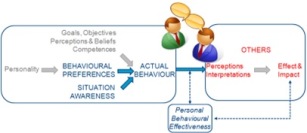LDT360 - THE MOST EDUCATIONAL CONVERSATIONS
Personal Behavioural Effectiveness
Judith Glaser: "With every positive conversation we develop new DNA"
One of the most spectacular discoveries in recent years is that our brains can produce new DNA in conversations with others (see the Conversational Intelligence video). In fact, our interactions with others appear to be the most important source of our personal growth. My opinion about the use of 3600 reports to assess employees was damning: how can you use such subjective information to make a judgement.
But what if you didn't use other people's information as a judgment, but as the reason for a 1:1 conversation between that other person and yourself?
The LDT360 method became a very successful way to systematically bring people into conversation with each other to listen to each other about something as exciting as the other person's observation of your own behavior and about tips that you receive for free. In many cases, the intimacy of the conversation also results in an improved mutual relationship.
INVITE FOR FEEDBACK AND LEARN FROM OTHERS
In the LDT360 module you start the process by inviting your observers to provide you with feedback and coaching. The feedback reviews will bring you a number of important new insights.
You will discover that the comments of people around you, although subjective, will always be worthwhile since they bring you important information and trigger your self reflection.
The objective for you, using the LDT reports, is to become more effective in your leadership behaviour and to develop your leadership talent by acquiring competences and styles that fit with your ambition as a leader.
LDT360 reporting
After having received the observer’s responses, LDpe will produce the LDT360 reports as your first feedback. These reports will immediately trigger your self-reflection. But your learning will be deepened during the reviews with the individual observers. Each observer will be able to remind you about real life situations and you can ask him about the background of his perceptions. You will also discover that you can learn from an observer's feedback, even when the score of that observer tends to differ from the Observers average score.
What the LDT360 reports will help you with is to very professionally prepare for the 1:1 reviews.
You will be able to identify the questions to ask your observer while referring to the gap between his scores on your behaviour and your self-score.
The LDT360 reports show how different observers score you on the dimensions of your personality profile and the consequences of these scores for potential qualities and possible pitfalls.
But the opinions of others are of course very interesting.
In fact, you can learn a lot from it!
With the LDT360 we have set up a wonderful method to obtain systematic feedback for anyone who is open for listening to the opinions of others. It turns out to have become the most educational part of our entire program...
We have worked out an example. Download the presentation about Freddy Moss by clicking on the photo
Since every score is subjective (even your own self-image) you should learn to see how the specific subjective perception of the observer has been founded from his interpretation of the specific context. In fact, different observers may score differently, depending on context and your mutual interrelation.
While analysing the report, you should realise that an observer's perception is 'the truth' for him.
This perception, however, is strongly influenced by:
- The organizational context and culture (openness, security, strain, hierarchy, market circumstances, internal competition and politics, support
between colleagues, etc.);
- Hierarchical and the social relation between the observer and yourself;
- The history of co-operation between the observer and yourself;
- How deeply the observer really knows you;
- The personality of the observer;
- The personal 'fit' between the observer and yourself.




